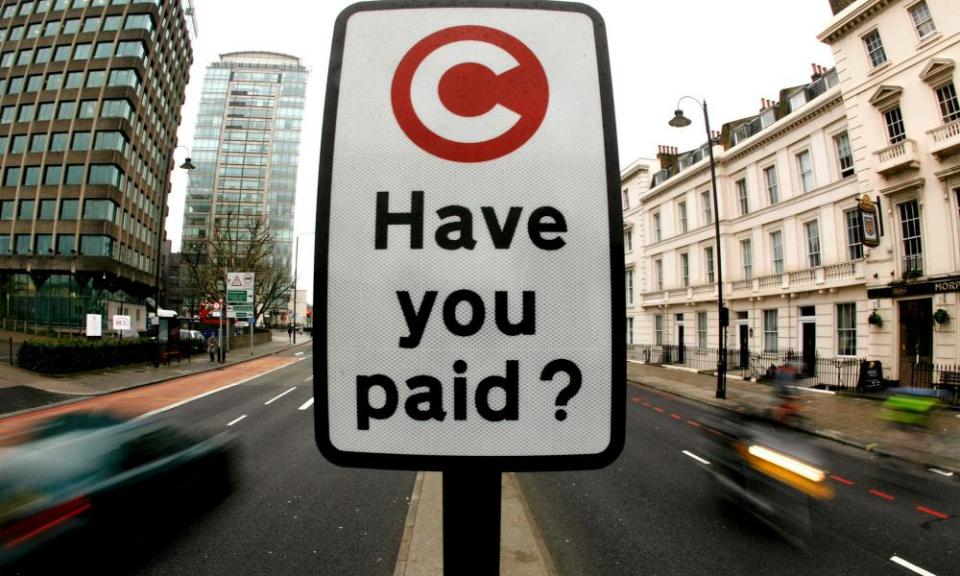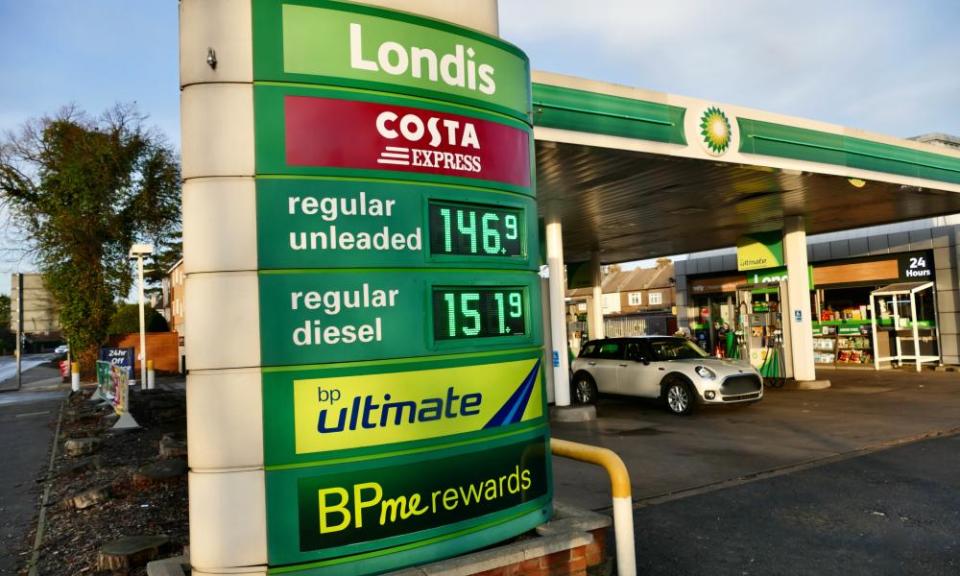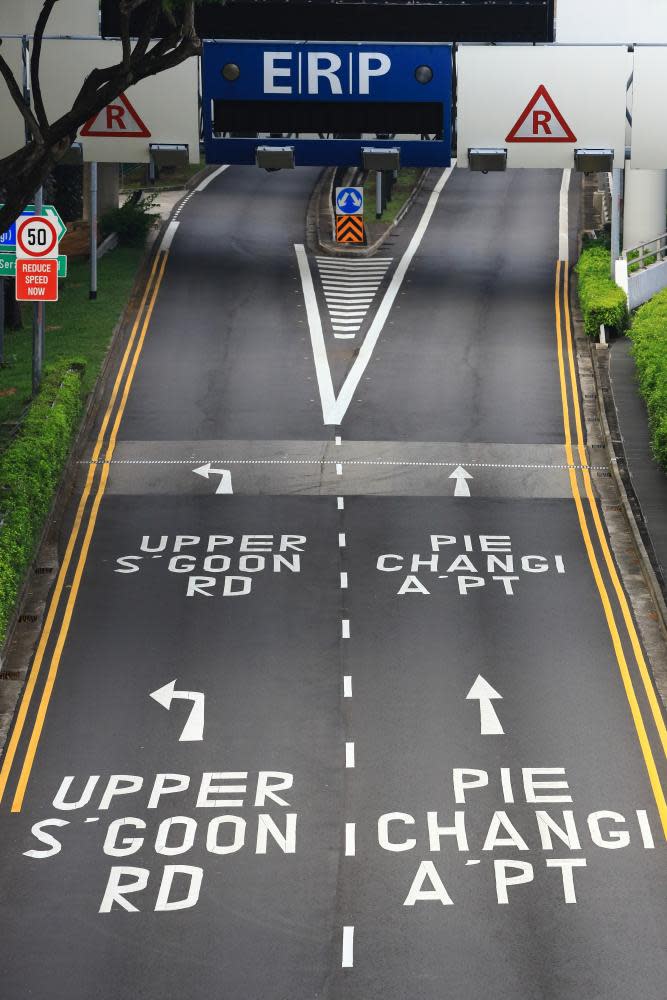Will road pricing answer the UK’s net-zero car-tax conundrum?

Politicians dislike discussing how to replace fuel duty and road tax but a clear option is now in view
Road pricing may promise a fairer, sustainable way to make polluting drivers pay, ease congestion and fund better transport, but few politicians in power have ever wanted to take the flak that would come with introducing it.
The Treasury has stressed the move from petrol and diesel to electric cars as part of Britain’s net zero strategy will require new sources of revenue to replace billions in lost fuel and vehicle excise duty. However, despite a year of speculation that the chancellor, Rishi Sunak, was warming to the idea, there has been no mention of road pricing as a possible solution in his budgets.
Sadiq Khan has been bolder, announcing last week that London will bring in more charges for motorists, in some form, by 2024.
While Khan has backed road pricing in principle, last week’s announcement still contained the familiar caveat that the technology to make a London-wide scheme work wouldn’t be ready until some time later in the decade.
The city is potentially the canary in the coalmine for the rest of the UK. Congestion has grown, and London needs to tackle widespread air pollution and meet challenging environmental targets, with an ambition to drive down car use by more than a quarter. But there is also an imminent funding crisis after Covid, with billions in lost revenue from transport and the government unwilling to fully help the mayor.
Why is road pricing likely to happen, how might it work and what are the potential obstacles?
The finances
Roads, unlike most utilities, are essentially unmetered, with the way they are paid for failing to reflect when and where they are used.
Instead the Treasury collects money from motorists via fuel duty and vehicle excise duty. Fuel duty is a blunt tool that charges motorists for how much they drive, and the efficiency of their vehicle. Raising it has become politically toxic – Conservative chancellors have frozen the 57.9p-a-litre levy for a decade – but the bigger longer-term problem is the move to electric cars. That puts fuel duty revenues, about £28bn a year pre-pandemic, on their own path to net zero.

Vehicle excise duty, worth roughly £6bn a year, is also currently not paid by electric car owners, who are likewise exempt from London’s congestion or clean air charges. That is seen as an acceptable trade-off for the high purchase price of electric cars for early adopters, but car owners driving “for free” could soon feel politically tricky, and in the long term new funding, such as road pricing, feels inevitable.
The logistics
Worldwide, basic road-charging schemes currently range from tolls for bridges, tunnels, or stretches of motorway, to the kind of congestion zone London already has, often relying on number plate recognition cameras, transponders or other sensors.
Singapore has arguably come closest to a comprehensive road-pricing scheme, with motorists billed automatically for journeys calculated via in-car units triggered when they pass a series of gantries. The system was first put in place before the millennium.
But the grid road system in the small city state makes it relatively easy to calculate where someone has driven from a series of fixed points. London’s eventual scheme – particularly if it does, as the mayor suggested, take account of factors such as the relative availability of public transport, congestion, or time of day as well as distance travelled – would require some form of GPS tracking.
The technology
Khan said the tech could be ready in two and half years, just beyond his remaining term in office. The Green party and others argue it has been ready for years, in various forms. For example, car owners have grown used to insurers installing black boxes that can track speed and performance.
A smart road-pricing scheme could require in an in-car device, as used in Singapore – but that could be replaced by a smartphone and app. As any user of satnav or exercise apps knows, an individual’s movements can already be tracked effectively.

However, Steve Gooding, the director of the RAC Foundation, is less convinced: “Is [the technology] ready at the scale it needs to be, for everything it needs to do, for all the vehicles moving in Greater London 365 days a year?”
Civil liberties
London’s congestion zone was originally set up in 2003 by the then mayor, Ken Livingstone, with clear separation from the other arms of the state. But in 2015 his successor, Boris Johnson, instructed Transport for London to give full access to the data to the Metropolitan police, and records of who drives into central London are now stored for two years.
The Green party’s Siân Berry, a London Assembly member who has long backed the idea of road pricing, says stricter safeguards should be in place around the data – and more would certainly be needed should journeys be logged by GPS. That could be via an app that is under the driver’s own control in terms of details, or an in-car unit that tots up charges but does not keep a journey history, she suggests. “But you need to put privacy into the conversation early on, not later, or you risk it becoming an issue that cancels the scheme.”
Fairness
As a report in 2021 from Tony Blair’s Institute for Global Change noted, this cuts both ways: do nothing to reform the system and the wealthiest electric car owners will forever get a free ride while still using roads and creating congestion – and particulate pollution.
While it is argued that overall, road pricing should be fairer and beneficial, there may be winners and losers, particularly at the borders of schemes, and key workers with fixed shift times may not be able to avoid peak charges.
But the status quo is not fair for non car-owners, argues Berry. She adds: “It’s 20p for petrol or £1.50 for the bus for a short journey – the price signals are completely wrong.”
Public opposition
The London congestion charge proved less of a vote-loser for Livingstone than many anticipated. However, attempts by Labour in 2007 to implement a nationwide road-pricing scheme attracted what was then one of the biggest protest petitions from the public.
The tide may be turning, slowly. Concerns over car use and urban air quality are firmly on the agenda.
Motoring organisations have also joined the call for charging in some form: the RAC Foundation backs it, while the AA’s Edmund King has proposed tradeable “road miles”, measured through telematics. A recent report from the Social Market Foundation thinktank claimed that the formerly hostile UK public could now be won over.

 Yahoo Finance
Yahoo Finance 